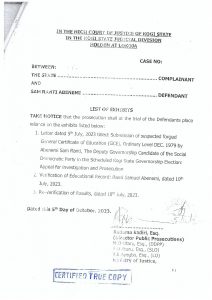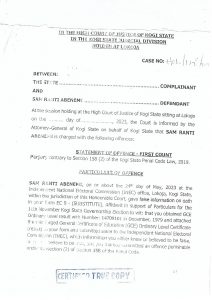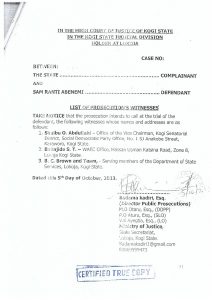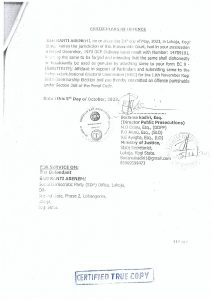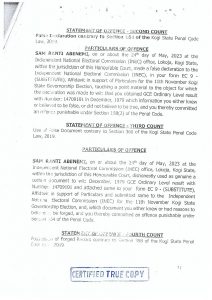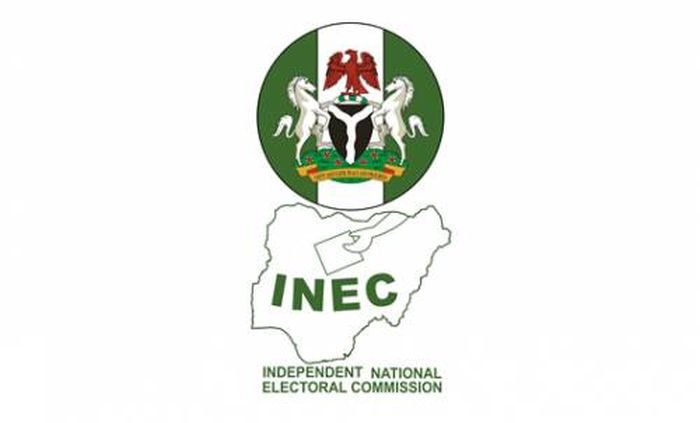Politics
Kogi Guber: Certificate forgery scandal, provision of false information to INEC hit SDP; Yakubu, Abenemi in trouble
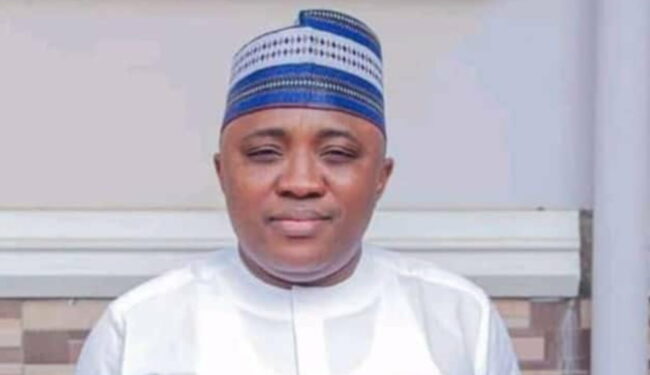
Kogi Guber: Certificate forgery scandal, provision of false information to INEC hit SDP; Yakubu, Abenemi in trouble
Three weeks to the conduct of the governorship election in Kogi State, an eligibility crisis has erupted in the Social Democratic Party (SDP). Murtala Yakubu (Ajaka) and Abenemi Sam Ranti are the governorship and deputy governorship candidates of the party for the November 11 election.
But, it is no longer at ease with the duo and their supporters as allegations of Perjury, False Declaration, Use of False Document and Possession of Forged Record are not only drizzling literally on their ambition, they are pouring seriously and obliterating any moral compass they have to stand for election and canvass for votes.
The latest scandal is now at the centre of every discussion among voters in the Confluence State. With official confirmation by the West African Examination Council (WAEC) to the Department of State Services (DSS) that the running mate allegedly forged the 1979 GCE secondary school certificate he presented to the Independent National Electoral Commission (INEC), the duo may have kissed their dream of occupying the Government House, Lokoja bye bye.
In fact, legally, the candidate and his running mate are not on the ballot, going by similar cases in the past.
Documents obtained by Freedom Online in the build up to the election show that it is going to be an exercise in futility for the duo and they may have to wait till the 2027 election, that is, if genuine documents certified by government agencies are presented.
In essence, all votes cast for Yakubu and Abenemi on November 11 will eventually be declared by the Tribunal as wasted, win or lose, due to the established legal incapacity of Abenemi and SDP’s nomination as a whole unless they are able to provide admissible facts to the contrary.
Due to the alleged illegality involved in the documents submitted, the Director of Public Prosecution, Kogi State Ministry of Justice has preferred a four-count charge bordering on Perjury, False Declaration, Use of False Document, and Possession of Forged Record contrary to the provisions of the Kogi State Penal Code Law, 2019, against Abenemi Sam Ranti at the High Court of Justice, Kogi State.
Documents obtained by Freedom Online have shown that Yakubu and Abenemi are neck deep in allegations of submission of false information and forged certificate to INEC.
In a petition dated June 2023 and directed to the DSS and the Nigeria Police Force (NPF), it was also alleged Yakubu might have submitted a forged certificate to INEC as the Date of Birth submitted to the electoral body on his Form EC9 – (Substitute) was 13/02/1978, whereas the Date of Birth on the WAEC certificate submitted to INEC upon verification shows that the Date of Birth on same is 2/11/1978. It was, therefore, alleged that Yakubu might have submitted false evidence on oath to INEC.
On July 5, 2023, one Shaibu O. Abdullahi, in a petition written to the Nigeria Police Force (NPF) and the DSS, alleged that the “WAEC GCE Notification of Result with number 14709101 issued on 16/05/80 to one ‘Abenimi Ranti Samuel’ in respect of a General Certificate of Education, Ordinary Level December 1979 Examination’ is forged or fake.” The said Notification of Result was submitted to INEC by Abenemi for the November 11 election.
Details have now emerged that the DSS investigated the allegation of forged Certificate, and found that the candidate number stated on the said GCE Notification of Result submitted by the Deputy Governorship candidate belongs to another person and not Abenemi.
In response to official enquiries by the DSS, WAEC reportedly confirmed that the Deputy Governorship candidate was not the owner of the Candidate Number and the result contained in the GCE Examination Notification of Result submitted to INEC.
It was revealed that the candidate with the number sat for five subjects instead of the two stated on Abenemi’s alleged forged certificate.
Investigation also revealed that in his Form EC9-(Substitute)(Affidavit in Support of Personal Particulars), which the Deputy Governorship Candidate submitted to INEC on 26/5/2023, he stated on oath that he possesses a WAEC Certificate obtained in 1979, and, as evidence, attached the allegedly forged GCE 1979 Notification of Result.
His form EC9 also showed that while he claimed on oath to have a First School Leaving Certificate obtained in 1971, he did not attach same to the Form EC9. Hence, the only Certificate submitted by Abenemi in support of his qualification for the office of Deputy Governor of Kogi State was the allegedly forged 1979 GCE Notification of Result.
Consequent upon the foregoing, the Director of Public Prosecution, Kogi State Ministry of Justice preferred a four-count charge bordering on Perjury, False Declaration, Use of False Document, and Possession of Forged Record contrary to the provisions of the Kogi State Penal Code Law, 2019, against Abenemi at the High Court of Justice, Kogi State.
While the proceedings are ongoing, the development has raised concerns as to the eligibility or legal capacity of the candidates to participate in the elections and the overall effect of the alleged forgery should the SDP win the election.
With or without the conviction of Abenemi by the court, the fact of the forgery, having been confirmed by WAEC, has already created a burden for SDP and its candidates. While the SDP will not be precluded from participating in the election on the basis of the forgery, it is generally believed that there is no useful value to the party’s participation.
More or less, it would amount to an exercise in futility, according to political analysts and legal experts.
Interpreting the scenario, a frontline lawyer and activist from one of the Northern states, who spoke with Freedom Online on the condition of anonymity, said, “All votes cast for the party at the election will eventually be declared by the Tribunal as wasted votes, win or lose, due to the established legal incapacity of Abenemi and SDP’s nomination as a whole.
“The reasons for the foregoing prognosis are very clear: Section 177 of the 1999 Constitution of the Federal Republic of Nigeria prescribes the qualification criteria for a person to contest as a Governor and Deputy Governor (see 187(2)). One of such criteria (paragraph 177(d)) is that such a person ‘has been educated up to at least School Certificate level or its equivalent.’
“Hence, if a person does not have a minimum requirement or qualification to contest for the position of Governor/Deputy Governor of a State, it means that he is not qualified to so contest for the position.
In the case of Abenemi who has only presented a GCE Notification of Result, which has been verified to be forged by WAEC, it is clear that he is not qualified to contest for the position of Deputy Governor, hence the joint ticket, automatically becomes invalid by virtue of Section 187(2) of the 1999 Constitution(as amended).
“Another reason is the fact that Section 182(1)(j) of the 1999 Constitution (as amended) which provides for grounds for disqualification of a person from contesting the seat of Governor/Deputy Governor of a State specifically disqualifies a person who has provided a forged certificate to INEC in the following words: No person shall be qualified for election to the office of Governor of a State if … he has presented a forged certificate to the Independent National Electoral Commission.’
“The foregoing provisions which are clear and unambiguous and which must be given their natural meaning gives no room for any doubt as to the fatal effect of the forged GCE Notification of Result submitted to INEC by Abenemi.
“It is clear that in the event of the SDP winning the elections, the victory will no doubt be nullified on the basis of the candidates’ legal incapacity occasioned by non-qualification and presentation of forged certificate to INEC by Abenemi.
“This is reminiscent of the Supreme Court case of PDP & Ors v. Degi-Eremienyo & Ors (2020) LPELR-49734(SC) (Pp. 8-16 paras. D-D) where the joint ticket of David Lyon and his Deputy Governorship Candidate in Bayelsa State was held to be vitiated by the disqualification of the Deputy Governorship Candidate based on submission of false information/document to INEC.
“In fact, both candidates were disqualified by the Supreme Court and ‘deemed not to be candidates at the governorship election conducted in Bayelsa State.’”
It is generally believed that this is the fate which awaits Yakubu, Abenemi and the SDP at the election, should they win, according to opinion polls.
Also, in the case they do not win the said election, the SDP and their Candidates’ locus standi to challenge the victory of the winner of the election at the Tribunal will be incapacitated as the issue of their qualification may be raised in response to their petition or as a cross petition.
However, Section 33 of the Electoral Act 2022 allows political parties to substitute their candidates only in the case of death of the nominated candidates or withdrawal.
In the case of withdrawal, there is a deadline for such substitution. For the Kogi election, the deadline for the substitution of candidates set by INEC expired on May 26, 2023.
Indeed, this window of substitution brought in Yakubu and Abenemi as SDP candidates on May 20, 2023.
“Hence, the only ‘remedy’ which is most impracticable is death which nobody prays for. Sections 33 and 34 of the Electoral Act 2022 provides copious provisions on this process,” the lawyer said.
It must, however, be noted that in the entire history of democratic elections in Nigeria, only one substitution (arguably) occasioned by death has been recorded and coincidentally same occurred in the 2015 Kogi State Governorship Election which produced the current Governor, H.E. Yahaya Bello.
Going by this statistics, it is impracticable near impossible that this will repeat itself to save the troubled SDP ticket.
While the SDP will not be precluded from participating in the November 11 election based on the certificate forgery scandal, the futility of the party’s participation in the election is a big source of worry to the party, according to a top national SDP official who spoke in confidence to our reporter.
*Culled from Freedom Online.
news
Journalists for Good Governance Shines Searchlight on Local Government Administration

Journalists for Good Governance Shines Searchlight on Local Government Administration
…Calls for Accountability in Nigeria’s Grassroots Governance
LAGOS, Nigeria — A civil society coalition known as Journalists for Good Governance(JGG) has intensified public debate on transparency and accountability within Nigeria’s local government system, urging media professionals, civil society actors, and citizens to hold grassroots leaders accountable.
Speaking an event in Lagos recently, the acting chairman of the society, Comrade Bunmi Obarotimi said that despite reforms such as the Supreme Court’s 2024 ruling granting financial autonomy to all 774 Local Government Areas (LGAs), systemic challenges continues to hinder effective service delivery and responsible stewardship of public funds.
“Local governments are the closest tier of government to the people — yet too often they remain the least transparent. Without civic oversight and vibrant media, promises of autonomy ring hollow.” the acting chairman said.
The Journalist for Good Governance emphasised crucial roles that journalists can play in uncovering discrepancies in council spending, flagging poor service delivery, and educating citizens on their rights. Their call comes amid wider efforts by media and civic organisations to bridge accountability gaps. The civil society initiatives had previously launched monitoring campaigns to track local government expenditures and have been quietly advocating for transparency in how public money is deployed.
The leaders of the Journalists for Good Governance (JGG) highlighted the importance of physical assessment and citizens engagement on projects to boost people’s confidence, urging local councils to adopt open data platforms and proactive information dissemination in compliance with the Freedom of Information Act. Experts say the majority of LGAs currently lack operational websites or digital portals, further limiting public scrutiny.
The Journalists for Good Governance initiative aligns with sustained advocacy by civil society groups and governance experts calling for a collective approach to strengthening democratic accountability, and has decided to engage in critical and holistic assessments of how Local Governments is being run and the impact and quality of projects they embark-on and to address deficits in transparency and public trust.
Meanwhile, some state governments have signalled support for improved community engagement. In Lagos State, authorities reiterated a commitment to enhancing community media platforms as vehicles for civic participation and accountability at the grassroots level.
The renewed spotlight on local government administration has reignited public debate over fiscal responsibility and priorities. Controversies such as the widely criticised Adamawa council chairmen’s wives trip to Istanbul — which drew public outrage for perceived misuse of public funds — underscore why watchdog groups say stronger oversight mechanisms are urgently needed at the grassroots.
Citizens and activists have welcomed the journalists’ initiative, calling for sustained media engagement that goes beyond headlines to influence policy and accountability reform.
The civic rights advocates note that real change will require robust legal frameworks, a free press, and empowered communities equipped to demand transparency at every level of governance.
As Journalists for Good Governance mobilises its members, the coming months are likely to see heightened media attention on grassroots administration — from council budgets and service delivery to the enforcement of public information laws and digital transparency initiatives.
Politics
Gov. Dauda Lawal commissions projects in Anka LGA, Commits to Sustainable Development

Gov. Dauda Lawal commissions projects in Anka LGA, Commits to Sustainable Development
The Executive Governor of Zamfara State, Dr. Dauda Lawal, has reiterated his administration’s steadfast commitment to guiding Zamfara State towards sustainable development by inaugurating and initiating a series of pivotal projects in the Anka Local Government Area.
Among the key undertakings announced are the comprehensive reconstruction and modernization of the Emir of Anka’s palace, signaling a revitalization of traditional leadership; the initiation of work on the crucial Anka–Abbare Road, which is expected to significantly improve connectivity; and the construction of a new Local Government Secretariat.
Additionally, the projects encompass the establishment of dedicated offices for the Hisbah Commission and the Community Protection Guards, alongside the reconstruction of the Safe School in Anka, emphasizing the administration’s focus on enhancing educational infrastructure.
During the commissioning event, Governor Lawal highlighted that these projects are a fulfillment of commitments made during his campaign, aimed at transforming the local landscape by improving infrastructure, stimulating economic growth, bolstering public service efficiency, and enhancing the capacities of security agencies. He called for a collective effort from the community to ensure proper maintenance of these facilities, underscoring the shared responsibility in preserving public assets.
Governor Lawal shared that similar projects have also been inaugurated in Tsafe, with plans for upcoming projects in Kaura Namoda, Moriki, Bungudu, Bukkuyum, and Zurmi, all expected to be completed and inaugurated by the year’s end. This ambitious timeline reflects the administration’s urgency in addressing the development needs of various regions within the state.
In his remarks, the governor urged residents and local traditional institutions to collaborate closely in maintaining the newly commissioned structures and supporting the overarching objectives of his administration. “I stand here in Anka today to honor our commitments to the people of Anka Local Government and all of Zamfara State. The official opening of the new palace for the ‘Sarkin Zamfaran Anka’ and the Zamfara State Council of Chiefs is a significant milestone that wraps up today’s agenda,” he stated.
Governor Lawal emphasized the strategic importance of the Anka–Abbare Road, describing it as a critical artery that will not only enhance access to remote areas but also stimulate economic activities and generate multiplier effects throughout the local economy. He articulated the necessity of providing a conducive work environment for civil servants, affirming that the new local government secretariat and dedicated offices will significantly contribute to strengthening law and order within the state.
“Education is the cornerstone of any thriving society. Our focused initiatives are oriented towards fostering a safe, secure, and supportive environment for our students. I am also proud to announce the completion and commissioning of the reconstructed SAFE School Anka today,” he remarked, reaffirming the administration’s dedication to education.
The governor further noted that the commissioning of the Emir’s Palace serves to restore the historical prominence of traditional institutions, which he regards as pivotal custodians of the region’s culture and heritage. He underlined the administration’s awareness of the invaluable role that these institutions play in fostering the state’s growth and emphasized the necessity of aligning development projects with cultural values.
In conclusion, the governor mentioned that after the successful commissioning in Anka and Tsafe, future projects in Kaura Namoda and Moriki will follow suit, while those in Bungudu, Bukkuyum, and Zurmi remain on track for completion and official commissioning before the year concludes.
news
GEN CHRISTOPHER GWABIN MUSA SUPPORT INITIATIVE HAILS GOVERNOR UBA SANI’S APPOINTMENT AS RENEWED HOPE AMBASSADOR
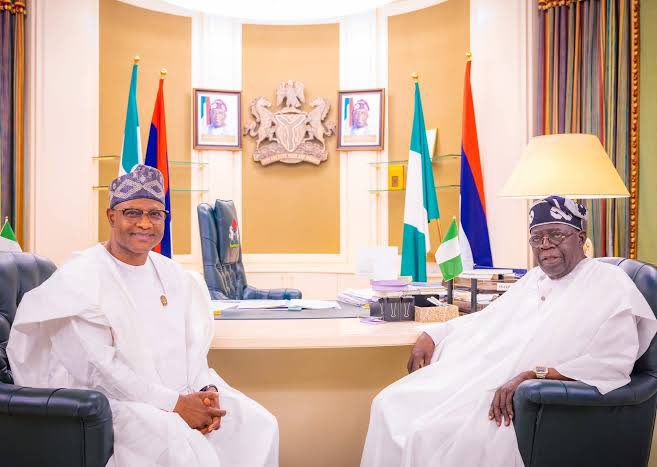
GEN CHRISTOPHER GWABIN MUSA SUPPORT INITIATIVE HAILS GOVERNOR UBA SANI’S APPOINTMENT AS RENEWED HOPE AMBASSADOR
The Gen Christopher Gwabin Musa Support Initiative (GCGMSI) has extended its warm congratulations to His Excellency, Mallam Uba Sani, the Executive Governor of Kaduna State, following his recent appointment as a Renewed Hope Ambassador and Deputy Director-General for Party Outreach, Engagement, and Mobilisation by the All Progressives Congress (APC).
This felicitation was formally conveyed in a statement signed by the Initiative’s Convener, Ibrahim Dahiru Danfulani, Sadaukin Garkuwan Keffi/Betara Biu, and disseminated to the press.
The statement highlighted that the Grand Patron of the GCGMSI, His Excellency General Christopher Gwabin Musa, OFR, Minister of Defence of the Federal Republic of Nigeria, received the news of the appointment with great pride but without surprise. According to the statement, General Musa expressed unwavering confidence in Governor Uba Sani’s proven capability and salient leadership qualities, affirming that the Governor is eminently equipped to deliver on every task entrusted to him.
The Grand Patron further extended profound appreciation to the President and Commander-in-Chief of the Armed Forces, His Excellency Asiwaju Bola Ahmed Tinubu, GCFR, for recognising and finding Governor Uba Sani worthy of this critical national assignment. The appointment, which takes effect immediately, was made by the President in his capacity as the leader of the APC, citing the Governor’s exceptional organisational abilities and strategic acumen.
In his new role, Governor Sani is tasked with working in close collaboration with the Director-General of the Renewed Hope Ambassadors and the party hierarchy, including the National Chairman of the APC. His primary mandate is to ensure harmony, inclusiveness, and strategic coordination across all levels of the party’s mobilization and engagement architecture, a vital function for advancing the political agenda.
Demonstrating its commitment to national service and effective governance, the GCGMSI, under the direct directive of its Grand Patron, General Musa, has officially mobilised its formidable structure. The Initiative has pledged the full deployment of its extensive network, seasoned personnel, and robust operational framework to assist and support Governor Uba Sani in the successful execution of his new responsibilities.
The Gen Christopher Gwabin Musa Support Initiative, renowned for its disciplined organisation, widespread grassroots penetration, and capacity for large-scale civic mobilisation, stands ready as a pivotal force. This move underscores the GCGMSI’s pivotal role as a key support system for national development initiatives and its unwavering dedication to fostering unity and progress under the Renewed Hope agenda.
-

 celebrity radar - gossips6 months ago
celebrity radar - gossips6 months agoWhy Babangida’s Hilltop Home Became Nigeria’s Political “Mecca”
-

 society6 months ago
society6 months agoPower is a Loan, Not a Possession: The Sacred Duty of Planting People
-

 society5 months ago
society5 months agoReligion: Africa’s Oldest Weapon of Enslavement and the Forgotten Truth
-

 news6 months ago
news6 months agoTHE APPOINTMENT OF WASIU AYINDE BY THE FEDERAL GOVERNMENT AS AN AMBASSADOR SOUNDS EMBARRASSING


